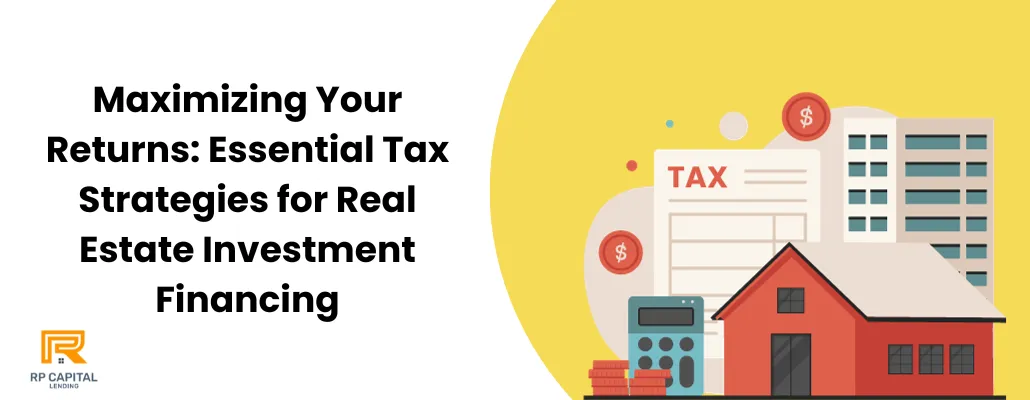Blog

Maximizing Your Returns: Essential Tax Strategies for Real Estate Investment Financing
Real estate investment financing isn't just about finding funds; it's a strategic game, especially when it comes to taxes. The right knowledge can turn taxes from a burden into an advantage. In this article, we're diving deep into the intricate world of tax considerations in real estate investments.
Whether you're a seasoned investor or a newcomer, understanding these facets is crucial for maximizing your returns and minimizing tax liabilities. We'll explore everything from capital gains to property taxes, offering insights to help you navigate the complex tax landscape of real estate investment.
Understanding Real Estate Investment Financing
Real estate investment financing is more than just securing a loan; it's understanding how this financial leverage impacts your overall investment strategy, especially tax implications. It involves various funding sources, including mortgages, private loans, and government-backed programs.
Each option carries unique tax considerations, affecting your investment's profitability. Understanding these options and their tax implications is vital for effective financial planning in real estate. This knowledge not only helps in choosing the right financing but also prepares investors for the tax responsibilities and benefits associated with each financing option.
Key Tax Considerations in Real Estate Investment
When it comes to real estate investment, tax considerations play a pivotal role in determining your net returns. Here are some key aspects:
Capital Gains Tax:
It's vital to understand how profits from property sales are taxed. Strategies like holding properties for over a year can qualify for lower long-term capital gains rates, significantly affecting your investment's profitability.
Property Taxes:
These are ongoing costs that vary greatly depending on location and property value. Effective property tax planning can help manage these expenses and improve cash flow.
Depreciation Benefits:
Real estate offers unique opportunities for depreciation, allowing investors to deduct property wear and tear over time, thus reducing taxable income.
1031 Exchange:
This provision allows deferring capital gains tax by reinvesting proceeds from a property sale into another investment property, offering a strategic way to grow your real estate portfolio while deferring taxes.
Expert Insights on Maximizing Tax Benefits
To maximize tax benefits in real estate investment, it’s crucial to stay informed and strategic. One key insight is leveraging depreciation, which can significantly lower taxable income. Also, understanding and utilizing the 1031 exchange can defer capital gains taxes, freeing up more capital for reinvestment.
Investors should also consider the timing of sales and purchases to optimize tax outcomes. Consulting with tax professionals who specialize in real estate can provide tailored strategies, ensuring you're taking full advantage of available tax benefits and staying compliant with evolving tax laws.
Common Pitfalls and How to Avoid Them
One of the common pitfalls in real estate investment is overlooking the impact of capital gains tax, which can significantly reduce net profits from property sales. To avoid this, investors should plan their sale strategies, considering holding periods and tax rates. Another mistake is mismanaging property taxes, leading to unexpected financial burdens.
Staying informed about local tax rates and assessments, and budgeting accordingly, can mitigate this risk. Additionally, failing to claim all eligible deductions like depreciation can result in higher taxable incomes. Regular consultation with tax experts can help avoid these pitfalls.
Case Studies: Real-life Examples
Consider John, who invested in residential property and utilized depreciation deductions to reduce his taxable income, enhancing his investment's profitability. Another example is Sarah, who successfully executed a 1031 exchange, deferring capital gains tax from a property sale and reinvesting in more valuable property, thereby expanding her investment portfolio without immediate tax liabilities. T
These real-life cases illustrate how understanding and applying tax considerations can significantly impact real estate investment outcomes.
Future Trends in Real Estate Investment Financing
The real estate investment landscape is evolving, with trends like increased focus on sustainable properties gaining traction. These green investments not only offer environmental benefits but can also provide tax incentives, making them an attractive option for investors.
Additionally, technology-driven solutions are emerging, streamlining the financing process and offering more personalized investment strategies. Staying abreast of these trends is crucial for investors looking to adapt and capitalize on new opportunities in the market.
Conclusion
In conclusion, tax considerations are a crucial aspect of real estate investment financing. Understanding and strategically navigating these factors can lead to significant financial benefits and enhanced investment returns. By being aware of the key tax implications, utilizing expert insights, and learning from real-life case studies, investors can make informed decisions that maximize their investments' potential while staying compliant with tax laws.
FAQs
1. What is the most significant tax consideration in real estate investment?
Capital gains tax is crucial due to its impact on investment returns.
2. Can depreciation really benefit real estate investors?
Absolutely, it reduces taxable income and boosts profitability.
3. How does a 1031 exchange work in real estate?
It allows deferring capital gains tax by reinvesting in new property.
4. Are property taxes a major concern for real estate investors?
Yes, they directly affect investment profitability.
5. What's an emerging trend in real estate investment financing?
Sustainable financing for environmental and financial benefits.
Disclaimer: Loans only apply to non-owner occupied properties. Rates, terms and conditions offered only to qualified borrowers, may vary upon loan product, deal structure, other applicable considerations, and are subject to change at any time without notice.
Copyright © 2025. All Rights Reserved.


